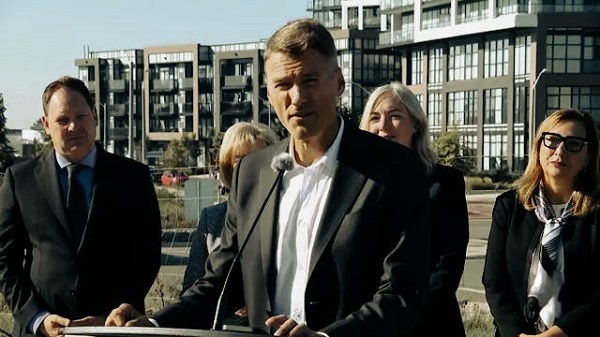Business
Ford’s Whisky War

 Marco Navarro-Génie
Marco Navarro-Génie
One could do a whole series of opinion and research pieces on how poorly educated Canadian politicians are about economic and trade principles. Below is my latest on the topic, focusing on Doug Ford’s latest philistine tantrum. My next piece will be on Wab Kinew. Writing on their lack of discipline and poor habits can be a cottage industry for commentators.
Haultain’s Substack is a reader-supported publication.
To receive new posts and support our work, please consider becoming a free or paid subscriber.
Try it out.
When a politician pours whisky on the ground, it usually means she has run out of ideas.
A few weeks ago, in September, Ontario Premier Doug Ford staged a protest worthy of a talk-show segment. Before a union crowd in Brampton, he emptied a bottle of Crown Royal onto the stage and vowed its maker, Diageo, would “pay dearly.” He threatened to pull Crown Royal (and several ither brands) from LCBO shelves, declaring Ontario would use its market power to punish the distiller for closing its Amherstburg bottling plant.
It was a vivid scene, part theatre, part tantrum, and entirely revealing.
Diageo is one of the world’s largest producers of spirits and beer, headquartered in London, England. It owns more than two hundred brands, including Johnnie Walker, Guinness, Tanqueray, and Baileys, and sells in over 180 countries. The company was formed in 1997 through the merger of Guinness and Grand Metropolitan, and it inherited Crown Royal from the old Seagram portfolio. Diageo’s Canadian operations remain significant, with the Gimli, Manitoba distillery producing every drop of Crown Royal whisky sold worldwide. It’s a Canadian product.
Diageo’s decision was not an act of treachery but arithmetic. The company plans to close its Amherstburg facility by 2026, shifting bottling to Quebec and parts of the United States. Roughly two hundred jobs will vanish. For a town of twenty-three thousand, that is a deep cut. Yet Ford’s reaction transforms an industrial decision into a political drama. He recasts an economic adjustment as a moral betrayal, as if loyalty to Ontario were a debt every business must pay in perpetuity.
That sentiment plays well at partisan rallies. But in practice, it blurs the boundary between government and market. When politicians confuse the two, policy becomes a tool of temper rather than governance.
Once a premier signals that he will use public institutions like the LCBO as weapons, investors take note. And they should. They infer that Ontario’s business climate can change with the premier’s mood. Capital, unlike politicians, is dispassionate. It goes where rules are predictable and contracts honoured, not where leaders lecture firms for disobedience.
Markets, as Adam Smith observed, are a network of trust. Replace trust with coercion or shaming, and investment flows away as surely as whisky poured on the pavement.
Ford casts himself as the friend of “working people.” Yet his fury threatens workers far from Ontario. The whisky he attacked onstage is distilled and aged in Gimli, Manitoba, from prairie grain and Canadian labour. Eighty people work at that distillery. Thousands of farmers supply its rye and corn. If Diageo decides Canada has become a political hazard, those Manitoban jobs will be among the first casualties. A tantrum in Brampton can send a chill all the way to Lake Winnipeg.
This is the irony of populist economic nationalism: in defending a few hundred local jobs, it imperils thousands more across the whole federation. It’s thoughtless.
Ford’s rhetoric also clashes with his own record. When electric-vehicle battery ventures trimmed their job projections despite billions in subsidies, the premier offered understanding, not outrage. When Brookfield shifted parts of its business operations abroad, there was no rally, no public denunciation, no bottle hitting the floor. Evidently, corporate disloyalty is tolerable, until it involves whisky.
Such inconsistency is not a principle but an impulse. Governments that choose favourites create uncertainty for everyone. When rules bend to political sentiment, each firm wonders whether it will be next in line for punishment. And so the province that once competed for investment becomes a place investors compete to avoid.
If Ford truly wished to defend Ontario’s workers, he would ask why bottling in his province became uneconomic in the first place. The answer is not a mystery. Ontario carries high energy costs, heavy regulation, and steep land prices. Every company weighs those burdens. Threatening one firm for noticing them will not persuade others to stay.
Political anger cannot repeal common sense arithmetic.
The irony deepens because Crown Royal remains Canadian in every essential sense. Its grains, water, and labour are Canadian. Its distilling craft and heritage are Canadian. Ownership by a British firm changes the shareholder, not the spirit. Punishing that success because it offends provincial pride reduces patriotism to parochialism. The brand’s global reach is a quiet advertisement for Canadian skill, and it is an achievement to be respected, not vandalized.
The premier’s defenders will say he is merely standing up for Ontario workers. But bluster is not courage. Proper defence of working people lies in creating the conditions that let enterprise and local ingenuity flourish. When government swaps policy for theatre, it only feeds resentment and starves opportunity.
Economic freedom depends on restraint. Governments must regulate and tax modestly, but they must also know when not to act. Every unnecessary intervention signals risk. The LCBO should be a neutral marketplace, not a political cudgel. Once it becomes a stage for senseless retribution, the line between free commerce and state coercion dissolves.
Ontario’s grievance is understandable; its method is reckless. A government may lament job losses, negotiate incentives, or compete for reinvestment. It may not commandeer a marketplace to punish a decision it dislikes. In a constitutional order, power is exercised through law, not vendetta.
Amherstburg deserves sympathy. No question. Two hundred jobs lost in a small town is no abstraction. Yet the premier’s faux fury will not restore them. Instead, it risks ensuring that the next investor leaves quietly rather than risk the wrath of the premier and public humiliation. Markets remember humiliation longer than speeches.
Crown Royal will survive this episode. The whisky made in Gimli will continue to be sold worldwide, enjoyed by people who have never heard, and will likely never hear, of Ontario’s premier. But the image of a provincial leader pouring it out onstage will endure too. It is an emblem of how quickly cheap populism can trade reason for spectacle.
Ontario must decide what kind of province it wishes to be: a jurisdiction that welcomes enterprise, or one that punishes it when it moves. If every business is expected to pledge fealty to the premier’s emotions, the province will learn how swiftly loyalty evaporates.
When politics meddles in markets, both lose dignity. The government becomes a performer; the market, its prop. The result is neither freedom nor prosperity, only theatre.
Doug can pour out all whisky in Ontario, if he likes. The rest of the world will raise a glass to markets that keep their cool.
Haultain’s Substack is a reader-supported publication.
To receive new posts and support our work, please consider becoming a free or paid subscriber.
Try it out.
Automotive
Parliament Forces Liberals to Release Stellantis Contracts After $15-Billion Gamble Blows Up In Taxpayer Faces

After betting taxpayer billions on a green-industry deal that collapsed under U.S. tariffs, MPs move to expose what Ottawa promised Stellantis and what Canadians actually got for the money.
Parliament just blew the lid off one of the biggest corporate giveaways in Canadian history.
For years, Ottawa and Queen’s Park have bragged about “historic investments” in green manufacturing. What they didn’t say is that $15 billion of your money went to Stellantis, the Dutch auto conglomerate behind Chrysler, Jeep, and Ram, only for the company to announce it’s cutting 3,000 jobs in Brampton and shipping them south to the United States.
That betrayal is what triggered a heated meeting of the House of Commons Government Operations Committee on October 21. What started as routine procedure turned into a full-scale reckoning over how billions were handed to a foreign corporation with almost no strings attached.
Conservative MP Garnett Genuis opened with a blunt motion: produce every contract, memorandum of understanding, or side deal the government signed with Stellantis and its affiliates since 2015. Every page, every clause, in both official languages, “without redaction.” The demand wasn’t symbolic, it was about finding out if Trudeau’s government ever required the company to keep those Canadian jobs it was paid to “protect.”
Liberals scrambled to block it. MP Jenna Sudds proposed an amendment that would let bureaucrats black out whatever they deemed “sensitive.” In practice, that meant hiding anything embarrassing — from cabinet discussions to corporate fine print. Opposition MPs called it exactly what it was: a cover-up clause. It failed.
The committee floor turned into open warfare. The Bloc Québécois tried a softer sub-amendment giving the House Law Clerk power to vet redactions. Conservatives countered with their own version forcing departments to hand over unredacted contracts and justify any blackouts in writing. After a suspension and some backroom wrangling, a rare thing happened: compromise.
The motion passed unanimously. Even the Liberals couldn’t vote against it once the light was on.
The debate itself revealed how badly Ottawa has lost control of its own economic agenda. Conservatives pressed officials on why Canadians were paying billions for “job creation” only to see Stellantis pack up for Illinois once U.S. tariffs came down. Liberals blamed Trump, tariffs, and “global conditions,” the excuses were almost comical. Liberal members blamed Donald Trump —yes, really— for Stellantis abandoning Canada. According to them, Trump’s tariffs and “America First” trade policy scared the company into moving production south.
But here’s what they didn’t say: Trump announced his 2024 presidential campaign on November 15, 2022, promising to rip up Joe Biden’s green industrial agenda and bring manufacturing back to U.S. soil. Everyone heard it. Everyone knew it. And yet, on July 6, 2023, more than half a year later, Ottawa proudly unveiled its $15-billion subsidy for Stellantis and LG Energy Solution — a deal built entirely on the assumption that Trump wouldn’t win.
So let’s be clear about what happened here. They didn’t just hand billions to a foreign automaker. They gambled that the next U.S. president wouldn’t change course. They bet the house —your tax dollars— on a political outcome in another country.
Think about that. Fifteen billion dollars of public money wagered on a campaign prediction. They bet on black, and it landed on red.
Even if the gamble had gone their way — even if Trump had lost and Biden’s green subsidy regime had survived untouched — the deal would still have been a terrible bargain.
During the committee meeting, the Bloc Québécois pointed to the 2023 Parliamentary Budget Officer’s report, which projected that the combined federal and Ontario subsidies to Stellantis and Volkswagen, roughly $28 billion total, including Stellantis’s $15 billion share, wouldn’t even break even for twenty years. That means taxpayers would have to wait until the mid-2040s just to recover what Ottawa spent.
So imagine the “best-case scenario”: the U.S. keeps its green-industry incentives, the plant stays in Canada, and production runs at full capacity. Even then, ordinary Canadians don’t see a financial return for two decades. There are no guaranteed profits, no guaranteed jobs, and no repayment. It was a long-odds bet on a global policy trend, financed entirely with public money.
In other words, whether the roulette wheel landed on black or red, the house still lost because the government put your chips on the table in a game it never controlled.
Behind the numbers, the story is brutally simple: Ottawa slid its chips across the table, wrote the cheques, and Stellantis walked away with the winnings. When MPs tried to see the receipts, the government grabbed for the cover of secrecy — no sunlight, no scrutiny, just “trust us.”
Now, for the first time, Parliament is about to peek under the table. The committee will finally see the real contracts — not the press releases, not the slogans, but the fine print that tells Canadians what they actually paid for. The review will happen behind closed doors at first, but the pressure to show the public what’s inside will be enormous.
Because if those documents confirm what MPs already suspect —that there were no job guarantees, no clawbacks, and no consequences —then this isn’t just a bad hand. It’s a rigged table.
Ottawa didn’t just gamble with taxpayer money; it gambled against the odds, and the dealer —in this case, Stellantis— already knew the outcome. Even if the wheel had landed on black, taxpayers were still stuck covering a twenty-year “break-even” fantasy, as the Bloc reminded everyone.
The next two weeks will show Canadians whether their government actually bought jobs or just bought headlines. One thing is certain: the high-rollers in Ottawa have been playing roulette with your money, and the wheel’s finally slowing down.
Subscribe to The Opposition with Dan Knight .
For the full experience, upgrade your subscription.
Business
Canada Revenue Agency has found a way to hit “Worse Than Rock Bottom”

From Conservative Part Communications
Last month, Carney’s Minister responsible for the Canada Revenue Agency (CRA) debuted their new slogan: “It can’t get much worse than it is now.” Today, the Auditor General reported that under the Liberals, it has.
Over the 2024/25 period, only 18 per cent of callers were able to reach a CRA agent within 15 minutes, a far cry from the target of 65 per cent of callers. In June, the numbers plunged to just 5 per cent of callers able to get through within the service standard of 15 minutes.
The average wait time took over half an hour, double what it was the year prior. And that was if you were even given the option of getting help. Nearly nine million calls were “deflected” by an automated voice telling Canadians to figure it out themselves, with no option to speak with an agent.
Wait times are so bad that over 7.6 million calls were disconnected before callers were able to reach an agent or be provided automated service. As wait times continue to get worse and worse, Canadians have just given up, evidenced by 2.4 million more abandoned calls over the previous year.
Even when Canadians manage to get hold of an agent, employees regularly fail to provide correct information about personal and business taxes. Auditors found the call centre gave incorrect information 83 per cent of the time when asked general individual tax questions.
Non-specific questions about benefits, including about eligibility, were wrong 44 per cent of the time. Meanwhile, the CRA’s automated chatbot “Charlie”, meant to relieve the call centre, answered only two of six tax-related questions correctly.
“How is it that an organization so important to the smooth functioning of the country is failing to serve Canadians and, as the Auditor General notes, places greater importance on adhering to shift schedules and breaks than on the accuracy and completeness of the information provided?” asked Gérard Deltell, Conservative Shadow Minister for Revenue.
It’s no surprise that complaints about the CRA’s contact centre increased 145 per cent from 2021/22 to 2024/25. Despite this, the Liberals announced they will begin auto-filing taxes for 5.5 million Canadians, automatically enrolling people in benefits the CRA is regularly unable to provide accurate information about.
Worse of all, the cost of the CRA’s call centre has ballooned from $50 million over 10 years in 2015 to $190 million. The total cost is projected to continue rising to $214 million over the next two years, a more than 320 per cent increase from the original contracted amount.
Meanwhile, Auditors found “there was no process documented or followed to ensure that amounts invoiced … were accurate and reflected the services received,” and that there was “little evidence that invoice details were appropriately reviewed and approved by … the Canada Revenue Agency prior to issuing payment.”
The Liberals have delivered higher taxes and higher costs with worse service for Canadians. We deserve better than continued Liberal failures. Conservatives will continue holding Carney accountable and fight to cut taxes and waste so Canadians keep more of what they earn.
-

 Business6 hours ago
Business6 hours agoQuebecers want feds to focus on illegal gun smuggling not gun confiscation
-

 Uncategorized1 day ago
Uncategorized1 day agoNew report warns WHO health rules erode Canada’s democracy and Charter rights
-

 Business6 hours ago
Business6 hours agoEmission regulations harm Canadians in exchange for no environmental benefit
-

 Energy1 day ago
Energy1 day agoMinus Forty and the Myth of Easy Energy
-

 Courageous Discourse4 hours ago
Courageous Discourse4 hours agoNo Exit Wound – EITHER there was a very public “miracle” OR Charlie Kirk’s murder is not as it appears
-

 Frontier Centre for Public Policy2 days ago
Frontier Centre for Public Policy2 days agoOttawa Should Think Twice Before Taxing Churches
-

 Alberta2 days ago
Alberta2 days agoBusting five myths about the Alberta oil sands
-

 Business1 day ago
Business1 day agoUS government buys stakes in two Canadian mining companies









